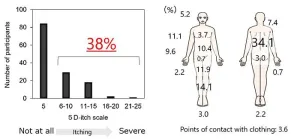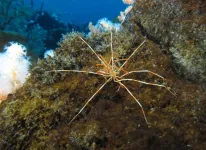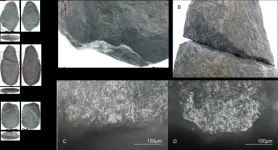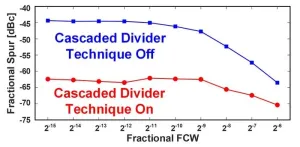(Press-News.org) Potassium deficiency in agricultural soils is a largely unrecognised but potentially significant threat to global food security if left unaddressed, finds new research involving researchers at UCL, University of Edinburgh and the UK Centre for Ecology & Hydrology.
The study, published in Nature Food, found that more potassium is being removed from agricultural soils than is being added, throughout many regions of the world. It also gives a series of recommendations for how to mitigate the issue.
Potassium is a vital nutrient for plant growth that helps with photosynthesis and respiration, the lack of which can inhibit plant growth and reduce crop yields. Farmers often spread potassium-rich fertilisers over their fields to replenish the depleted nutrient, but supply issues can inhibit its use, and there are lingering questions about its environmental impact.
The researchers report that globally, about 20% of agricultural soils face severe potassium deficiency, with particular regions likely to experience more critical shortages, including 44% of agricultural soils in South-East Asia, 39% in Latin America, 30% in Sub-Saharan Africa and 20% in East Asia, largely due to more intensive agricultural practices.
Co-author Professor Mark Maslin (UCL Geography) said: “Potassium is critical to sustaining the crop yields that keep the world fed, and its depletion poses a significant threat to the food security of millions of people around the world. This is an overlooked issue that needs to be addressed with a range of actions as the world population continues to grow.”
Farmers often rely on potash as a fertiliser to replenish their field’s potassium, but the price of the mineral can be quite volatile. Potash production is highly concentrated, with just twelve countries dominating the nearly £12 billion international market for potassium fertilisers, with Canada, Russia, Belarus and China producing 80% of the world’s total raw potash.
The researchers highlight how in April 2022, the price of potash increased 500% above the previous year following a “perfect storm” of factors, including rising fertiliser demand, escalating fuel prices, recovery from the pandemic, a range of government actions around the world, and the Russian invasion of Ukraine. Russia and Belarus together export about 42% of the word’s potash supply, but following the Russian invasion of Ukraine in 2022, the UK, US, Canada and the EU imposed import sanctions on the two countries, disrupting global supplies and exacerbating the price spike.
Since the initial price spike, the cost of potash has fallen by about 50%, but remains elevated, raising concerns that farmers will not be able to access sufficient fertiliser to maintain food supplies under the current system.
Co-author Dr Peter Alexander of the University of Edinburgh said: “The volatility of potash prices has major implications across the global food system. Access to potassium is vital for farmers to maintain their crop yields, but the recent high cost of potash makes it more difficult for the most vulnerable to obtain.”
This market concentration and vulnerability is one of the reasons the researchers have called for better potassium management and a robust intergovernmental coordination mechanism. Currently there are no national or international policies or regulations governing the sustainable management of soil potassium akin to the systems that are being established for other vital crop nutrients like nitrogen and phosphorus.
In 2021, global potash consumption reached 45 million tonnes, with global production projected to rise to about 69 million tonnes in 2025 with new projects starting up in Belarus, Canada, Russia, Australia, Eritrea and the UK. However, potash mining has raised human rights concerns and has significant impacts on the environment. Potash mining generates millions of tonnes of refuse mostly composed of sodium chloride salts, which can leach into soils and salinise soil and water tables, harming plants and animals.
The impacts of potassium fertiliser runoff into local ecosystems are poorly understood, and the researchers recommend more study about its effects.
Lead author Will Brownlie of the UK Centre for Ecology & Hydrology, said: “The environmental impact of potash mining and use in agriculture is something that needs greater scrutiny. There’s much that we still don’t understand about the effects that artificial potassium enrichment has on nearby ecosystems. By wisely handling nutrients like nitrogen, phosphorus, and potassium together, we can reap multiple benefits, prevent pollution, boost crop yields, and minimise nutrient loss. It's about coordinating our approach for better farming outcomes.”
The researchers put forward six recommendations for policies and practices to prevent potential crop yield declines, safeguard farmers from price volatility and address environmental concerns. The recommendations include:
Setting up a global assessment of current potassium stocks and flows to identify the most at-risk countries and regions
Establishing national capabilities for monitoring, predicting and responding to potassium price fluctuations
Helping farmers maintain sufficient soil potassium levels with further research about the yield implications of limited potassium in various crops and soils
Evaluating the environmental effects of potash mining and developing sustainable application practices
Developing a global circular potassium economy that minimises the use and maximises the reuse and recycling of the nutrient
Increasing intergovernmental cooperation through the UN and other agencies to develop global policy coordination akin to what’s been developed for nitrogen
Notes to Editors
For more information or to speak to the researchers involved, please contact Michael Lucibella, UCL Media Relations. T: +44 (0)75 3941 0389, E: m.lucibella@ucl.ac.uk
Will J. Brownlie, Peter Alexander, Mark Maslin, Miguel Cañedo-Argüelles, Mark A. Sutton, Bryan M. Spears, ‘Global Food Security Threatened by Potassium Neglect’ will be published in Nature Food on Monday 19 February 2024, 10:00 UK time/05:00 US Eastern Time and is under a strict embargo until this time.
The DOI for this paper will be: 10.1038/s43016-024-00929-8.
After publication, the paper will be available at: https://www.nature.com/articles/s43016-024-00929-8
Additional material
Professor Mark Maslin's academic profile
Dr Peter Alexander’s academic profile
Dr Will Brownlie’s academic profile
UCL Geography
UCL Social & Historical Sciences
University of Edinburgh
UK Centre for Ecology & Hydrology
About UCL – London’s Global University
UCL is a diverse global community of world-class academics, students, industry links, external partners, and alumni. Our powerful collective of individuals and institutions work together to explore new possibilities.
Since 1826, we have championed independent thought by attracting and nurturing the world's best minds. Our community of more than 50,000 students from 150 countries and over 16,000 staff pursues academic excellence, breaks boundaries and makes a positive impact on real world problems.
The Times and Sunday Times University of the Year 2024, we are consistently ranked among the top 10 universities in the world and are one of only a handful of institutions rated as having the strongest academic reputation and the broadest research impact.
We have a progressive and integrated approach to our teaching and research – championing innovation, creativity and cross-disciplinary working. We teach our students how to think, not what to think, and see them as partners, collaborators and contributors.
For almost 200 years, we are proud to have opened higher education to students from a wide range of backgrounds and to change the way we create and share knowledge.
We were the first in England to welcome women to university education and that courageous attitude and disruptive spirit is still alive today. We are UCL.
www.ucl.ac.uk | Follow @uclnews on Twitter | Read news at www.ucl.ac.uk/news/ | Listen to UCL podcasts on SoundCloud | View images on Flickr | Find out what’s on at UCL Mind
END
Potassium depletion in soil threatens global crop yields
2024-02-19
ELSE PRESS RELEASES FROM THIS DATE:
Poorly coiled frog guts help scientists unravel prevalent human birth anomaly
2024-02-19
How does our intestine, which can be at least 15 feet long, fit properly inside our bodies? As our digestive system grows, the gut tube goes through a series of dramatic looping and rotation to package the lengthening intestine. Failure of the gut to rotate properly during development results in a prevalent, but poorly understood, birth anomaly called intestinal malrotation. Now, in a study published in the journal Development, scientists from North Carolina State University have uncovered a potential cause of this life-threatening condition.
Intestinal malrotation affects 1 in 500 births but the underlying causes are not well understood. ...
Unveiling uremic toxins linked to itching in hemodialysis patients
2024-02-19
Niigata, Japan – Dr. Yamamoto et al. found the several uremic toxins as one of causes of itching in hemodialysis patients. Hemodialysis patients commonly experience itching on a daily basis, which is distributed throughout their bodies. They developed a "PBUT score" based on highly protein-bound uremic toxins (PBUT) that increase in the body with end-stage kidney disease. The PBUT score was associated with itching in hemodialysis patients.
I. Background of the Study
Patients with advanced chronic kidney disease (CKD) require kidney replacement therapy, such as hemodialysis, to manage their condition. Hemodialysis patients often experience various symptoms, ...
Communities must get prepared for increased flooding due to climate change, expert warns
2024-02-19
Communities must be better prepared for flooding in their homes and businesses, an expert warns, as climate change predictions suggest more extreme flooding globally.
Floods still inflict major costs to the economies, livelihoods and wellbeing of communities, with flood risks and impacts set to increase further due to climate change (IPCC, 2021).
Professor of Environmental Management, Lindsey McEwen explains how many experts now believe local communities have critical roles as key actors within flood risk management and disaster risk reduction.
Professor McEwen, author of Flood ...
Giant Antarctic sea spiders reproductive mystery solved by UH researchers
2024-02-18
Link to video and sound (details below): https://spaces.hightail.com/receive/JwM0o5gQdq
The reproduction of giant sea spiders in Antarctica has been largely unknown to researchers for more than 140 years, until now. University of Hawaiʻi at Mānoa scientists traveled to the remote continent and saw first-hand the behaviors of these mysterious creatures, and their findings could have wider implications for marine life and ocean ecosystems in Antarctica and around the world.
Sea spiders, or ...
This tiny, tamper-proof ID tag can authenticate almost anything
2024-02-18
A few years ago, MIT researchers invented a cryptographic ID tag that is several times smaller and significantly cheaper than the traditional radio frequency tags (RFIDs) that are often affixed to products to verify their authenticity.
This tiny tag, which offers improved security over RFIDs, utilizes terahertz waves, which are smaller and travel much faster than radio waves. But this terahertz tag shared a major security vulnerability with traditional RFIDs: A counterfeiter could peel the tag off a genuine item and reattach it to a fake, and the authentication system would be none the wiser.
The researchers have now surmounted ...
Viruses that can help ‘dial up’ carbon capture in the sea
2024-02-17
DENVER – Armed with a catalog of hundreds of thousands of DNA and RNA virus species in the world’s oceans, scientists are now zeroing in on the viruses most likely to combat climate change by helping trap carbon dioxide in seawater or, using similar techniques, different viruses that may prevent methane’s escape from thawing Arctic soil.
By combining genomic sequencing data with artificial intelligence analysis, researchers have identified ocean-based viruses and assessed their genomes to find that they “steal” genes from other microbes or cells that process carbon in the sea. Mapping microbial ...
Imageomics poised to enable new understanding of life
2024-02-17
Embargoed until 1:30 p.m. ET, Saturday Feb. 17, 2024
DENVER – Imageomics, a new field of science, has made stunning progress in the past year and is on the verge of major discoveries about life on Earth, according to one of the founders of the discipline.
Tanya Berger-Wolf, faculty director of the Translational Data Analytics Institute at The Ohio State University, outlined the state of imageomics in a presentation on Feb. 17, 2024, at the annual meeting of the American Association for the Advancement of Science.
“Imageomics ...
Scientists try out stone age tools to understand how they were used
2024-02-17
Tokyo, Japan – Researchers from Tokyo Metropolitan University crafted replica stone age tools and used them for a range of tasks to see how different activities create traces on the edge. They found that a combination of macroscopic and microscopic traces can tell us how stone edges were used. Their criteria help separate tools used for wood-felling from other activities. Dated stone edges may be used to identify when timber use began for early humans.
For prehistoric humans, improvements in woodworking technology were revolutionary. While Paleolithic (early stone age) artifacts point to the use of wood for simple tools such as spears ...
Combating fractional spurs in phase locked loops to improve wireless system performance in Beyond 5G
2024-02-17
Two innovative design techniques lead to substantial improvements in performance in fractional-N phase locked loops (PLLs), report scientists from Tokyo Tech. The proposed methods are aimed to minimize unwanted signals known as fractional spurs, which typically plague PLLs used in many modern radar systems and wireless transceivers. These efforts could open doors to technological improvements in wireless communication, autonomous vehicles, surveillance, and tracking systems in beyond 5G era.
Many emerging and evolving technologies, such as self-driving vehicles, target tracking systems, and remote sensors, rely on the high-speed and error-free operation ...
20th Annual National Jewish Health Respiratory Disease Young Investigators’ Forum calls for abstracts
2024-02-17
DENVER — Young physician investigators interested in research careers in pulmonology, allergy and immunology, pediatric and related programs, are encouraged to submit basic science or clinical research abstracts by June 3, 2024, to be considered for participation in the 20th Annual Respiratory Disease Young Investigators’ Forum. This year’s Forum will take place October 17-20, 2024, in Denver.
The annual event provides career development and research opportunities for fellows and early career faculty. The Forum is a celebration of talent and ingenuity in respiratory medicine. Physician-scientists in fellowship ...





